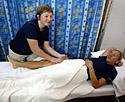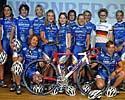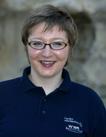
Recently on Cyclingnews.com |
An interview with Ellen Plas
Taking care of business with Equipe Nürnberger
Equipe Nürnberger soigneur Ellen Plas will be bringing us her stories from the masseur's table this year, starting with the Tour de l'Aude. She told John Stevenson how she got into one of cycling's most sought-after but sometimes least glamorous jobs.
Cyclingnews: You come from a cycling family; did you get into being a soigneur through racing?
 |
Ellen Plas: It started with being born in a family where baby bottles were banned, and bidons were in.
My dad was a professional cyclist from 1949 until 1962. On my mother's side of family, we had my cousin Michel Zanoli who kicked some ass on the bike too. Sometimes even literally. My brother David debuted with the professionals last year, at age 23, but somehow this sport we so love happens to be really unfair towards a lot of talented riders. I guess that money and connections are still the number one thing you need to make it on this earth.
Anyway, I used to race too, from age 15 till 22 (1991-1998). I was a pretty aggressive rider, I liked to kick it. My sprint wasn't my strongest thing, so I just made the racing as hard as possible. [When I won,] I won all of my races in a breakaway. I was junior national track champion in the pursuit (1992) and points race (1992, 1994), and regional champion (Brabant) in the road and TT in 1993 and 1994.
After my first year of senior women's racing and a lot of disappointment in a lot of people, I quit … the first time.
It turned out that my high school had been right from the beginning. They made me redo my exams in my last year, because they thought I had to be taught a lesson: you can't combine university and top-level sport). So totally depressed I quit physiotherapy and cycling at the same time and packed my bags to work as an au pair in Italy. There I met some people that got me motivated again.
The next year, I tried to pick up cycling again and combine it with a full time job with Belgacom. But I never got back to the level I was used to, nor to the weight of a bike rider. Once again I locked up all my ambitions in the closet.
But I never lost the passion for cycling, so I started to go to races to cheer, even in my holidays. In 1999 I followed the Giro d'Italia, as a tourist, just for fun. And I really wanted to get a job in cycling. I thought maybe as PR for a team, since I speak six languages, but it is and stays a men's world.
Then one day I saw this female soigneur on Mobilvetta, and my god, she had guts! She seemed to have it all under control and her riders seemed to respect her. Then I finally knew what I wanted to do with my life.
CN: What made the soigneur's job attractive?
EP: Cycling is a microbe. Once you have it, you won't ever get it out of your system. I will always love that smell of massage oil, the sound of changing gears, the atmosphere at races. It just makes your heart beat faster.
I've always wanted to travel, I've always wanted to stay in cycling, and I've always wanted to work with people, being able to learn as many languages as possible.
It's so much more exciting than a job from nine to five. Plus I don't really fit into the business world, I'm too intense a person: I highly value quality of life, and living it day by day, enjoying every single moment.
 |
Being a soigneur just fits my profile. It just happens that I'm really good with my hands, plus it makes me travel around the world, meet a lot of interesting people (not always in cycling), and it brings out the best in me, as the job also fits my personality.
I love to be the oasis of peace and rest where riders come after a race, I love to be the one they confide in, and to be able to listen and just be there to help.
Plus, it gives a feeling of freedom! When I have some time off, I just feel like I'm 'king of the world'. I can do whatever I want, with whomever I want while everyone else is sitting behind an office desk.
CN: Which teams did you work for before Nürnberger?
EP: In 2000 I had the pleasure of doing some races with Flanders-Prefetex, the under 23 Farm-Frites team, Polti, Cantina Tollo and Jack & Jones. In 2001 I started out with Coast, then passed on to Lotto, Mercury, fakta and did the World's with the US National team. Last year I worked full time for Saturn, which was probably the best year of my life until now. I met a lot of amazing, positive people and learned from what I still consider the best organisation I've ever seen.
CN: You've worked with both make and female riders, then. What are the differences?
EP: To be honest, after I quit cycling myself, I swore that I never wanted to work with women, EVER!
The job offer from Saturn was so tempting though. I would get to go to Australia, New Zealand, the US, Canada, and travel around Europe. Those aren't opportunities you get often in life. And at the same time, it turned out to be really difficult to find a full time job as a female soigneur in men's cycling.
It was quite difficult to adjust to women's cycling again. I had so many prejudices before, and I had to brush each and every single one aside.
 |
Knowing what I know now, I don't think I would ever want to change back to working with the men. Most people think women are more difficult to work with. From my experience, they will take their time to approve you and test if you are worthy of their trust. But once you have entered their hearts, they are yours forever, and stay loyal. Speaking about loyalty, that's how I came to Equipe Nürnberger. When Petra Rossner and Judith Arndt decided to sign for the German team, they asked me to join them. It's a decision I have never regretted.
As for men, they just forget. I've always enjoyed working with men though. But somehow you don't stay in close contact with them. They will always stop for a talk if they see you at a race, though, and that I really appreciate.
Also, as a woman, I feel more at ease in female cycling. I don't have to watch my back the whole time. Men can be terrible gossips and if they saw me treat male riders the way I treat my girls, they'd sure have a lot to talk about. So in a way, in men's cycling, I could never show the real me. I always had to be tough.
CN: What's life like with the Nürnberger team?
EP: I really love being on the road with my team. We have got so many amazing people! We have a really good mechanic whose smile just makes my day, Alex; a director who has a very good sense of humour and takes really good care of his staff (Jens); and then 12 wonderful girls!
Judith and Petra are two of the most honest and wise people in my life.
Madeleine Lindbergh is the sunshine on our team. We call her Madde Mudguard - sounds very Scandinavian, doesn't it? She got her nickname from taking her mudguard to Australia in the middle of summer! Even on the darkest day, she will always see the positive.
Then we have Birgit Söllner and Patty Hempel, who also both live in Nürnberg, which I'm really happy about, cause it is really difficult to meet new people in a new town, especially with a job like this; and they are fun to hang out with.
Hanka Kupfernagel was the one I was the most nervous about: we even raced together, back in the days we still had a women's Ronde Van Vlaanderen, so she has always been the one I looked up to - and now it's me massaging her legs. I just so hope she gets well really soon!
Jenny Algelid-Bengtsson - "min lille gumman" - is my Swedish teacher. I don't think six languages is enough, so I always want to learn more. Jenny has been ill ever since our first training camp and I am very looking forward to finally have her with us at the races.
Conny Cyrus is just the sweetest thing! Thanks Conny for the "Kinder Surprise"!
Liane Bahler is our youngest rider, but we mostly have to miss her as being in the military, she has to race on the German national team for World Cups and stage races.
Trixi Worrack, our little Trikski (yeah, we went skiing all together this winter) is also one of the sunshines on the team, and a really big talent!
Kerstin Scheitle is also a very wise and understanding woman, someone you can have other then 'cycling-conversations' with.
And last but not least, Margaret Hemsley, my OZZIE on the team! She has chosen the perfect place to stay in Germany, Bad Homburg. I'm glad I don't live there: I would be so broke. Margie lives in the middle of town, in the shopping street. But it's nice to stay with her and her husband Gregg, they are fun people to be with. Although it's not a good place for checking out men, as they all are over 70 and walk on crutches. It's a clinic town.
Each and every one on the team has a great personality which makes great chemistry… and I guess I am the glue that keeps it all sticking together.
CN: Tell us about a typical day for you.
EP: Getting up before everyone else, making sure the breakfast box is at the breakfast table (I usually also prepare muesli in the evening, so it's softened up in the morning… and they love it, with the good ingredients). I've usually set up the race car and my own feed zone car in the evening so all that I have left to do in the morning is making sandwiches for after the race, and for the staff. I'm really proud of those sandwiches of mine. I've come up with some really interesting recipes, so actually when we win, it's just because they wanted to get to their sandwich as fast as possible. Maybe one day I'll share my ingredients with you, so you can find out yourself.
In the race car, I've made sure that everything for the race is available. My own car has everything I need for start, feed zone and finish, and enough water, drink mix and empty bottles so I can get some work done for the next day. I try to use every spare minute, to win time in the evening.
At the start, I'll put out chairs, cooler, race food, and the girls mostly help themselves to what they need.
Then I put the bottles on their bikes, oil the legs, put tape on their ears so the receiver for the radios doesn't fall out. When there is time left, I go to the start line for any last minute calls.
The most important thing is to always be one step ahead of them. That means having ready what they will be asking for before they even pop the question.
At the finish, I'll be there again, having put out the chairs, drinks, their sandwich, everything they might need on the way back to the hotel. And I help them with cleaning up, when needed, though they mostly do it themselves.
Then back to the hotel, start the first washing machine with their dirty race clothing and get on with massage. Most of the time I'm on my own for six girls, which, especially during stage races, limits the time to 30 minutes each, because otherwise it gets too late, and they still need to sleep to recover.
When I have more time, I will spoil them as much as I can. And for the rest, I'm on a 24/7 stand-by.
CN: Soigneurs often get some menial jobs, especially when starting out. What's the worst job you've had to do?
EP: You really want to know? The worst thing ever, was during Bayern Rundfahrt, 2001, cleaning out the toilet of the camper. I was the camper driver, so that turned out to be my 'responsibility' … and they'd forgotten the product that makes everything liquid and neutral-smelling. I'm not going further into detail...
My very first tour, I did with Polti, the Deutschland Tour. And there I had to 'do the hotel'. [Get all the riders' bags and possessions to the hotel in time for the race finish, including arranging the rooms, putting riders' bags in their rooms, booking dinner and soon - Ed.] Vittorio Algeri said that if I could handle that, then I could handle anything. He turned out to be right, and I'm still grateful to him. It was a tough job, and I wasn't seeing anything of cycling, just the tired riders after the race. Now even doing the hotel is a piece of cake, you just learn to be organized and efficient.
Mostly, being new or being freelancer, you take your orders, and do what they ask you to do to your best abilities.
CN: What's the best part of the job?
EP: Being able to just be myself. No masks, no bullshit. You are who you are, and they love you for it no matter what. Plus the satisfaction of feeling you have it all under control.

